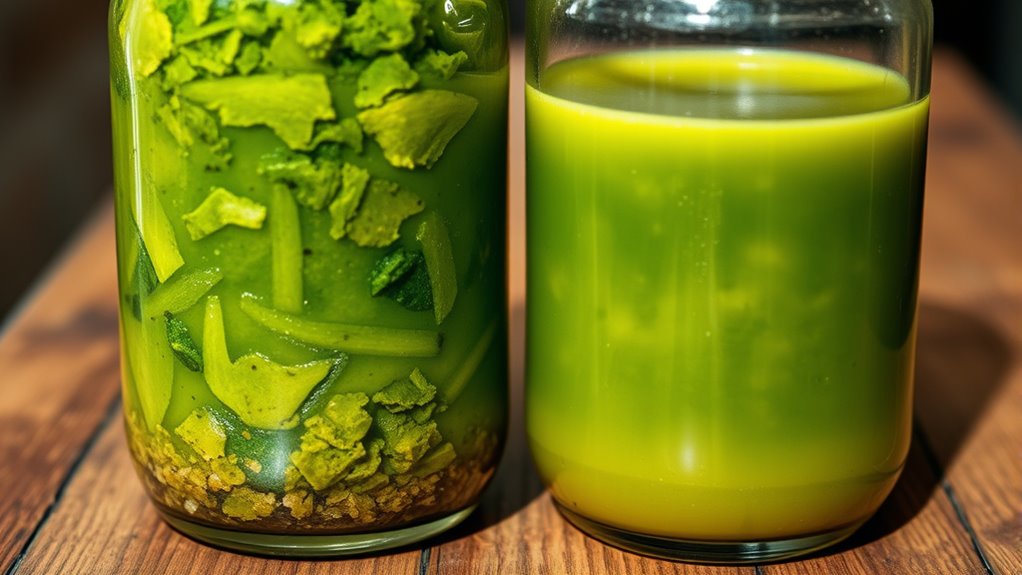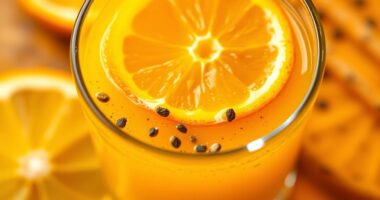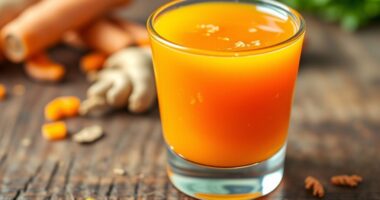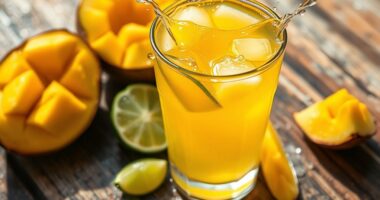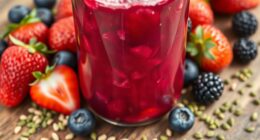Cold-press juicers operate slowly, crushing and pressing produce with minimal heat, which helps preserve delicate nutrients like enzymes, vitamins, and antioxidants. In contrast, centrifugal juicers spin produce at high speeds, generating heat and causing oxidation that rapidly destroys nutrients. As a result, cold-press juice retains more nutrients, stays fresh longer, and offers richer flavor. If you want to understand how these differences impact your health benefits, keep exploring the science behind each method.
Key Takeaways
- Cold-press juicers operate slowly, minimizing heat and oxidation, which helps preserve delicate nutrients like enzymes and antioxidants.
- Centrifugal juicers generate heat through rapid spinning, leading to nutrient degradation and loss of vitamins and enzymes.
- Cold-press juice maintains higher nutrient levels and antioxidants over longer storage periods compared to centrifugal juice.
- Oxidation occurs more rapidly in centrifugal juices, accelerating nutrient loss and reducing overall nutritional quality.
- Overall, cold-press juicers better preserve nutrients, making them superior for nutrient retention than centrifugal models.
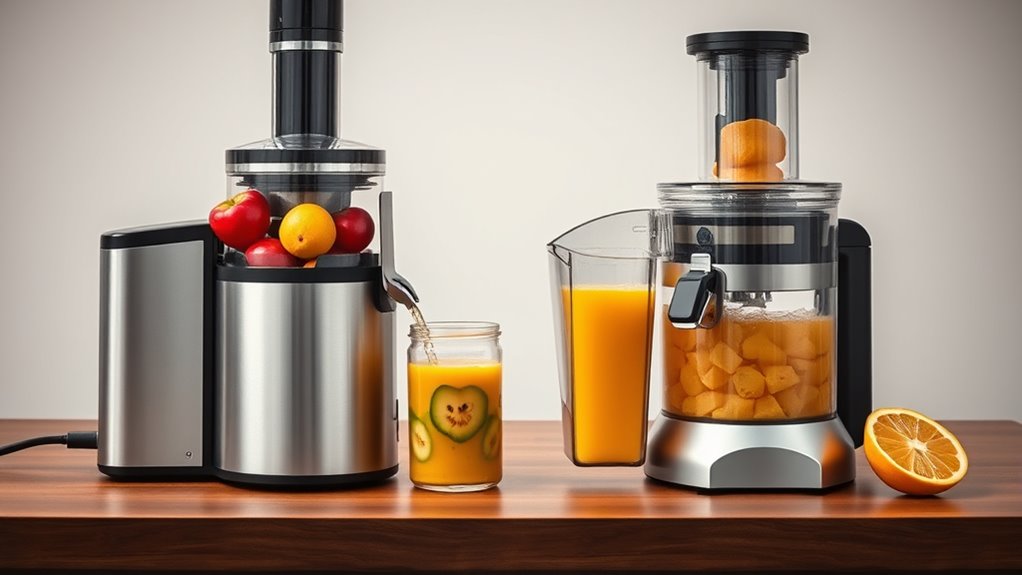
When choosing a juicer, understanding the differences between cold-press and centrifugal models can help you make an informed decision. The key factors to weigh are nutrient retention and juice shelf life, as these directly impact the quality and health benefits of your fresh juice. Cold-press juicers, also known as masticating juicers, operate slowly by crushing and pressing fruits and vegetables to extract juice. This slow process minimizes heat and oxidation, which helps preserve delicate nutrients like enzymes, vitamins, and antioxidants. As a result, cold-press juicers often produce juice with higher nutrient retention compared to their centrifugal counterparts. The slower extraction process also tends to yield juice with a longer shelf life—sometimes up to 72 hours when stored properly—because there’s less oxidative damage that can cause rapid degradation.
On the other hand, centrifugal juicers work at high speeds, using sharp blades to rapidly shred produce and spin the juice out through a filter. Because of this high-speed operation, heat and oxidation levels increase, which can lead to a significant loss of essential nutrients. The intense spinning action also introduces more oxygen into the juice, accelerating nutrient degradation. Consequently, juice from centrifugal machines generally has a shorter shelf life—often best consumed within 24 hours—since nutrients break down faster. When it comes to nutrient retention, cold-press models have a clear advantage, especially if you prefer to store your juice for later consumption. The preservation of enzymes and vitamins in cold-press juice makes it more nutritious over time, while centrifugal juice tends to lose some of its potency shortly after extraction. Additionally, research indicates that juice quality can be affected by the method of extraction, impacting flavor and texture.
Furthermore, the differences extend beyond nutrients. Cold-press juicers typically produce juice with a richer texture and more concentrated flavor because they extract more juice from the produce. This results in a more nutrient-dense beverage, which is ideal if you’re looking to maximize health benefits. Centrifugal juicers, although faster and more convenient, often leave behind more pulp and may produce a thinner juice with less overall nutrient density. If you plan to drink your juice immediately and prioritize convenience, a centrifugal model might suit your needs. However, if you’re committed to getting the most nutritional value and longer-lasting juice, a cold-press juicer is the smarter choice.
Frequently Asked Questions
How Do Juicer Noise Levels Compare During Operation?
When you compare juicer noise levels, you’ll notice cold-press juicers operate more quietly than centrifugal models. The juicer noise comparison shows cold-press machines produce minimal operational sound levels, making them ideal for quiet environments. On the other hand, centrifugal juicers tend to generate louder operational sounds due to their fast spinning blades. So, if noise is a concern, a cold-press juicer offers a more peaceful experience during juicing.
Which Juicer Type Has a Longer Lifespan With Proper Maintenance?
Think of your juicer as your trusty sidekick, standing the test of time. Cold-press juicers generally have a longer lifespan because their motor durability and component longevity are higher with proper maintenance. Centrifugal models, while quicker, tend to wear out faster. With regular cleaning and gentle handling, you’ll guarantee your juicer stays powerful and reliable, making it a lasting companion in your healthy lifestyle journey.
Are There Specific Fruits or Vegetables Better Suited for Each Juicer?
You’ll find that some fruit pairings, like berries and citrus, work better with centrifugals for quick juice and vibrant flavor. Cold-press juicers excel with leafy greens and root vegetables, preserving nutrient retention. If you want maximum nutrients, choose a cold-press juicer for delicate produce. For fast, convenient juice from firmer fruits, a centrifugal juicer is suitable. Matching produce to your juicer helps you get the best flavor and nutrition.
How Does Cleaning Complexity Differ Between Cold-Press and Centrifugal Juicers?
You’ll find cleaning routines differ markedly between cold-press and centrifugal juicers. Cold-press models often have fewer parts, making maintenance challenges minimal and cleaning more straightforward. Centrifugal juicers, however, tend to have multiple blades and screens that require thorough scrubbing, increasing complexity. If you prefer quick cleanup, cold-press juicers are easier to maintain, but if you’re okay with a bit more effort, centrifugal juicers still get the job done efficiently.
Can Juicer Type Affect the Shelf Life of the Juice Produced?
You might notice that juicer type impacts juice shelf life because of juice oxidation and pulp separation. Cold-press juicers, with slower extraction, reduce oxidation and keep juice fresh longer. Centrifugal juicers, which produce more heat and agitation, speed up oxidation, causing the juice to spoil faster. Proper pulp separation in cold-press juicers helps preserve nutrients, extending freshness. So, choosing the right juicer can markedly influence how long your juice stays good.
Conclusion
So, whether you choose a cold-press or centrifugal juicer, remember that both can deliver fresh nutrients—sometimes, it’s just a matter of timing. You might find yourself surprised how a simple switch in your morning routine could boost your health, especially when you least expect it. After all, isn’t it funny how life’s little choices—like your juicer—can make a big difference? Keep experimenting, and you might just discover your perfect blend.

